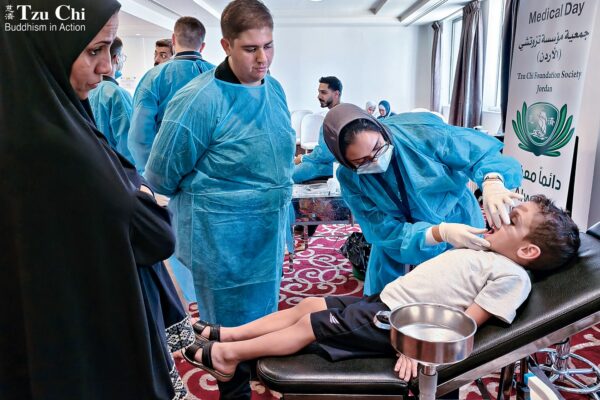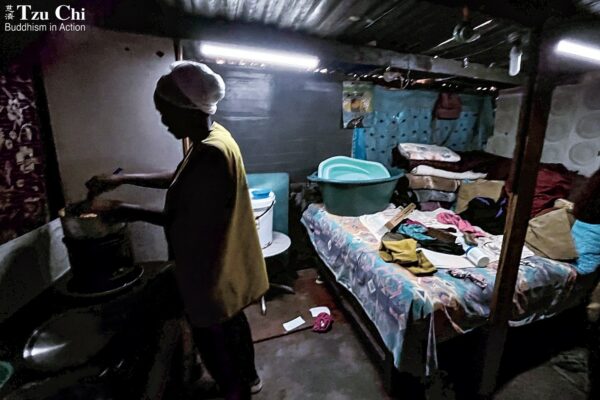By Lim Li Tian
Translated by Tang Yau-yang
The persistent prevalence of COVID-19 infections in Malaysia served as the backdrop for the Healthier Me 21-Day Challenge. More than 1,800 people have taken part since its inception nearly a year ago. They took charge of their health by participating, and were happy to see the results.
In November 2020, Tzu Chi volunteers in Malaysia and members of the Kuala Lumpur and Selangor chapter of the Tzu Chi International Medical Association (TIMA) started the Healthier Me 21-Day Challenge. By early September 2021, 1,807 people, ranging in age from 7 to 85, had taken up the challenge. Nearly half of them were not vegetarian. The program is still ongoing.
“The results of the participants’ blood tests have greatly touched me,” said Dr. Lim Lei Jun (林磊君). “It’s really uplifting! Never before in my 20-year practice have I seen changes in the right direction for so many people in just a three-week period. Their improvements were not in just one metric, but in all metrics.” Dr. Lim’s comments came in an online event marking the end of the first round of the health challenge program. At that time, she had seen the test results of just 50 program participants, but many more positive results have poured in since.
Volunteers staffing the program have so far collected more than 800 test results and accumulated ample experience. They have shared the impressive outcomes of the health challenge online with Tzu Chi volunteers in Taiwan and other countries, inspiring the launch of similar initiatives elsewhere. The project is especially relevant during a time when COVID-19 has impacted so many lives and caused so many deaths.
In July and August 2021, the pandemic in Malaysia worsened rapidly. By late August, an average of 20,000 new cases were being identified each day. By September, the country had accumulated 2,000,000 COVID infections and 22,000 deaths. Associate Professor Dr. Tan Toh Leong (陳沱良), an emergency physician at the Universiti Kebangsaan Malaysia Medical Centre, treats COVID-19 patients every day. He said in an interview that severe COVID patients experienced such difficulty breathing it was as if they were drowning. Some of them even had to endure the pain of intubation. “You absolutely wouldn’t want any of that,” he said.
Research has confirmed that chronic diseases increase the risk of severe illnesses and death from COVID-19 infections. Statistics released by the Malaysian government showed that of all who had died from COVID-19, close to 90 percent had suffered from at least one chronic disease. Sixty-five percent had suffered from high blood pressure, nearly half had diabetes, one quarter had heart disease, 20 percent kidney disease, and 17 percent high cholesterol.
Besides getting vaccinated and avoiding infections, the first order of business in dealing with the pandemic would be to try to bring down the risk of severe illnesses from COVID-19 infections for people suffering from chronic diseases. “What measure could be taken in one fell swoop to bring high blood glucose, high blood pressure, high cholesterol, and high uric acid all under better control?” Dr. Eddie Chan (陳成亨) pondered. He is the convener of TIMA Kuala Lumpur and Selangor, a practicing pediatrician, and a consultant in nutritional, lifestyle, and anti-aging medicine. After poring over reams of research papers, he found that a plant-based diet could help control or even reverse chronic diseases. He began to actively promote the diet as a way to treat the underlying conditions that make COVID-19 even more deadly.
Behind the more-than-a-thousand participants of the diet challenge in Malaysia are more than a thousand families. Participants and their family members alike are happy about the health benefits from the program. At the same time, more people are learning how to eat healthy as vegetarians. Photo1 courtesy of Billy Wong Hon Meng, photo3 courtesy of Ng Leong Eng, and photo2 courtesy of Kwan Pooi Chen
A dietary choice, not a substitute for medical care
Dr. Chan drew on the strengths of TIMA Kuala Lumpur and Selangor and community volunteers to promote the idea of a whole-food, plant-based diet in communities. He hoped that with the help of such a diet, people could better manage their blood fat, blood sugar, blood pressure, and body weight, and thus get a better handle on their health.
Malaysia is ethnically diverse, so it shouldn’t be surprising that spices and sauces of all types are indispensable in cooking. One of the challenges that faced people who wanted to try a whole-plant diet was how to cook a meal that met the diet’s requirements. To counter the challenge, Dr. Chan and his team developed a healthy dietary project: the Healthier Me 21-Day Challenge.
Under this project, menus were designed based on a healthy eating plate recommended by the American College of Lifestyle Medicine. Restaurants were engaged to prepare lunch and dinner for participants. Participants could pick up the prepared meals at designated locations, or they could be delivered to their offices or homes. Participants were required only to make their own breakfast during the program.
Participants were encouraged to have blood tests before they started the diet and again at the conclusion of their 21-day round. The before-and-after tests would reveal the possible effects of the health challenge.
Keong Chee Hoe (姜志濠) is a 17-year vegetarian and a member of the program’s central committee. He said that before the program could get started, their food quality control team needed to examine and sample the meals that participating restaurants prepared. They checked the foods’ portion, presentation, and taste. Some restaurants failed quite miserably in the beginning, unable to pass muster even after four or five tries. “Their idea of a whole-food, plant-based diet was quite different from ours,” Keong said. Because such a diet was so foreign to local restaurants, project organizers did what they could to help participating restaurants out in the process, working and learning with them to pull things off.
Communities in areas from Selangor, to Kuala Lumpur, to Kuching and other places formed teams to host the health challenge in their neighborhoods. Even though people had restricted mobility during the pandemic, the Internet afforded a good means for volunteers to communicate and work together. Program volunteers, wherever they were, had support from the central committee, consisting of advisory, coordination, medical, administrative, food quality control, and promotion teams, each staffed by volunteers with relevant expertise. For example, the food quality control team was made up of dieticians, physicians, and volunteers good at cooking. They carefully checked everything to ensure that participants ate only healthy and tasty food.
In an online exchange meeting each weekend, participants shared what breakfasts they had prepared for themselves and learned about healthy eating. When the first 21-day round ended, an event marking the closure was held online during which a doctor analyzed the overall performance of the participants and gave out awards to people with the best improvements in their blood pressure, cholesterol, blood sugar, triglycerides, and weight. One closing event after another revealed that participants had remarkably high success rates in lowering their blood lipids, pressure, and glucose. Many enjoyed other unexpected benefits as well.
“I don’t want to look at my old photos now. I used to have a big belly, but it’s gone now,” said Billy Wong Hon Meng (黃漢民), a 60-year-old entrepreneur who took part in the challenge. He approached the challenge in the same way he handled his business affairs in terms of diligence and intensity. He strictly adhered to the dietary guidelines prescribed by the program and abstained from alcohol during the 21 days. A blood test taken at the end of the round showed that his low-density lipoprotein (LDL) cholesterol and triglyceride levels had dropped significantly. On top of that, he had shed five kilograms (11 pounds).
A doctor who had read Wong’s blood test reports said that this health challenge had saved Wong’s life. His triglycerides had been so high as to have caused his LDL to spike off the charts. In that sort of situation, a person ran a very high risk of falling victim to cardiovascular diseases.
After his 21-day challenge had concluded, Wong decided to learn to be a vegetarian. His wife saw his changes and signed up for the program as well. Wong said, “This diet can keep me healthy, so I must stay the course.”
Oo Yi Qian (余奕倩) is a dietician and a member of the food quality control team. She saw one example after another of improved health numbers among program participants, so she and her husband signed up for the challenge too. “Medical care these days depends primarily on drugs to control high cholesterol, high blood sugar, high blood pressure, and high uric acid,” said the dietician. “Dietary changes and adjustments usually play a secondary role. Rarely have we seen examples of such obvious improvements in health numbers due to a modified diet alone. But in this program, we’ve seen abundant examples of reversals of high levels of blood pressure, blood lipid, blood glucose, and uric acid.”
When Oo Yi Qian was studying for a master’s degree in human nutrition at the University of Bonn, Germany, she read many research reports on nutrition that showed that people who consumed more plant-based foods were less likely to develop chronic diseases. Plants contained more nutrients than was generally known. That’s why she became a vegetarian five years ago.
Despite the many benefits of a whole-food, plant-based diet, program organizers reminded participants that this diet is a complement to, not a substitute for, medical care. The 21-day challenge gave participants an opportunity to experience the diet firsthand and provided them with a different dietary option, but the diet wasn’t intended to replace the need for a doctor’s supervision. Participants who were on medications still needed to continue their drug regimens and keep their doctors’ appointments.

Started in Malaysia, the Healthier Me 21-Day Challenge has been introduced to Taiwan, China, Singapore, Indonesia, the United States, Canada, etc. Huang Xiao-zhe
Staying the course with new diet knowledge
The 21-day healthy eating program not only introduces participants to the whole-plant diet, but helps participants understand what food is good for them, how to cook healthy, and how to stay on the diet after the challenge.
The health challenge is now being carried out in Taiwan, China, Singapore, Indonesia, the United States, Canada, and other places. In Malaysia, the program’s success has attracted the attention of local university researchers. They are planning to collaborate with Tzu Chi Kuala Lumpur and Selangor to use the results in scientific research. Staff at the health department of the Sarawak state government are also pondering how to bring this healthy diet plan into hospitals to improve the health of medical workers.
Dr. Eddie Chan and his team plan to promote the healthy diet to more institutions and regions. “I hope to bring about changes to society by helping more people understand the health benefits of a plant-based diet,” said the doctor.



